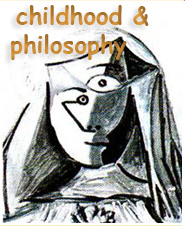what is the meaning of this cup and that dead shark? philosophical inquiry with objects and works of art and craft
Keywords:
Aesthetic inquiry, Objects, Works of art, Craft objectsAbstract
Philosophical inquiry in the UK has taken a somewhat different route from that in the US and various parts of Europe. Practitioners in the UK tend to use a great deal of home-grown materials instead of the IAPC books. They also rely on a range of philosophical stimuli that are not, or not exclusively, based on text. Their embeddedness in the North-American educational, cultural and linguistic contexts renders the IAPC texts sometimes opaque, even perplexing, to British child readers. This paper explores possibilities of initiating ‘aesthetic’ inquiry, i.e. philosophical inquiry with works of art and craft and other objects, e.g. religious artefacts and everyday, found or natural objects. It investigates the differences between aesthetic and conventional text based inquiries and makes suggestions about the advantages and value of aesthetic inquiry. That stimuli other than purpose-written philosophical texts are admissible as starting points for philosophical inquiry does not automatically mean that they work the same way as texts. In conventional enquiry the (purpose-written philosophical) text is the springboard for enquiry: a vehicle, and no more than that, to convey the participants to the realm of philosophical inquiry. The text has not, or is not meant to have, intrinsic aesthetic qualities. However, a picture, a piece of music or a craft object does have a different kind of physical reality from text, as well as inescapable aesthetic qualities. These qualities necessitate an approach to the inquiry that is different from the text-based one. Whilst the literature on aesthetic inquiries has been increasing, albeit slowly, their special characteristics do not yet seem to have been subjected to systematic investigation. Since it is my contention that there are important differences between text- and non-text-based inquiries both in terms of their nature and the nature of the inquiry they generate, I hope that this paper will contribute to a discussion on these differences.Downloads
Download data is not yet available.
Downloads
Published
2012-02-08
Issue
Section
articles



